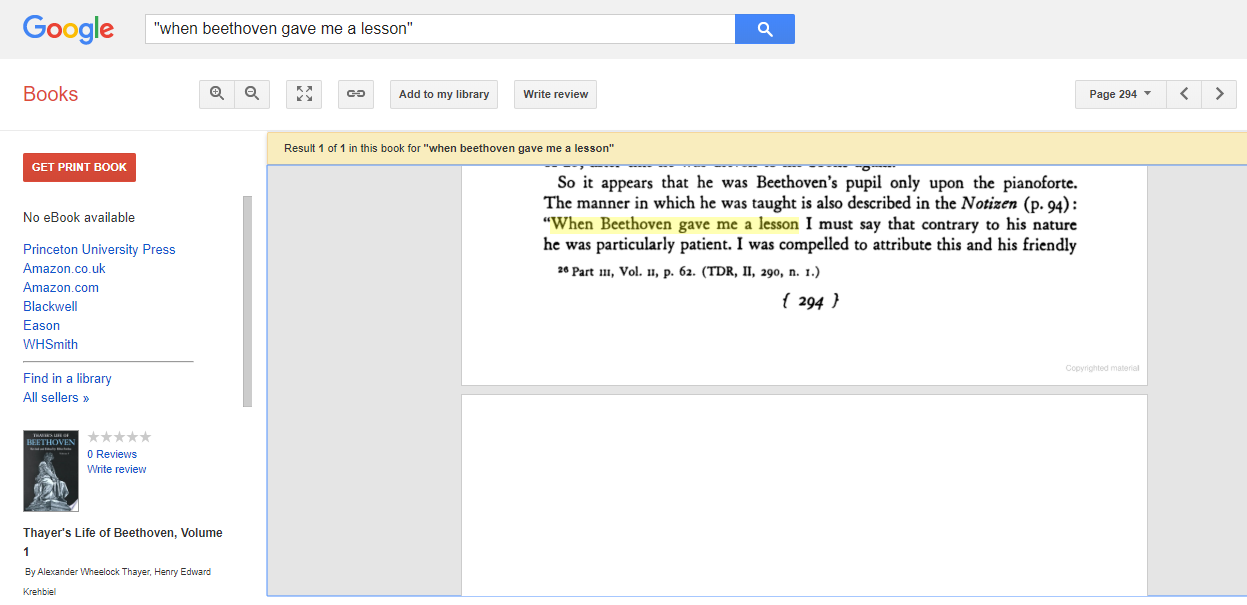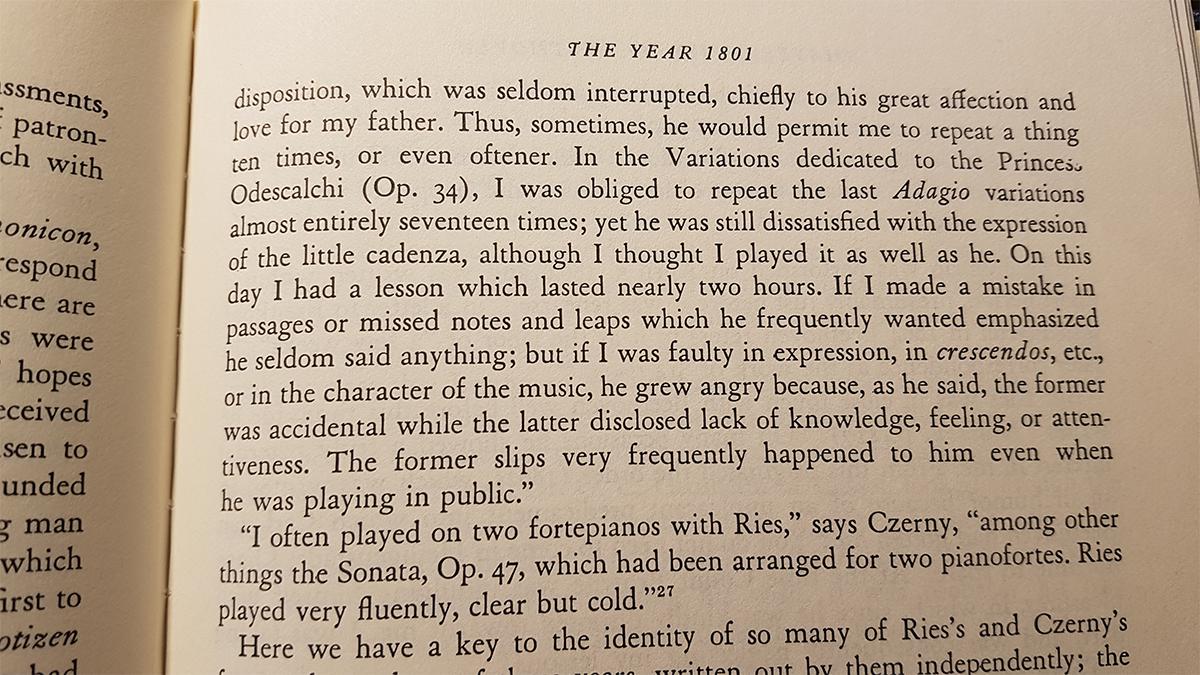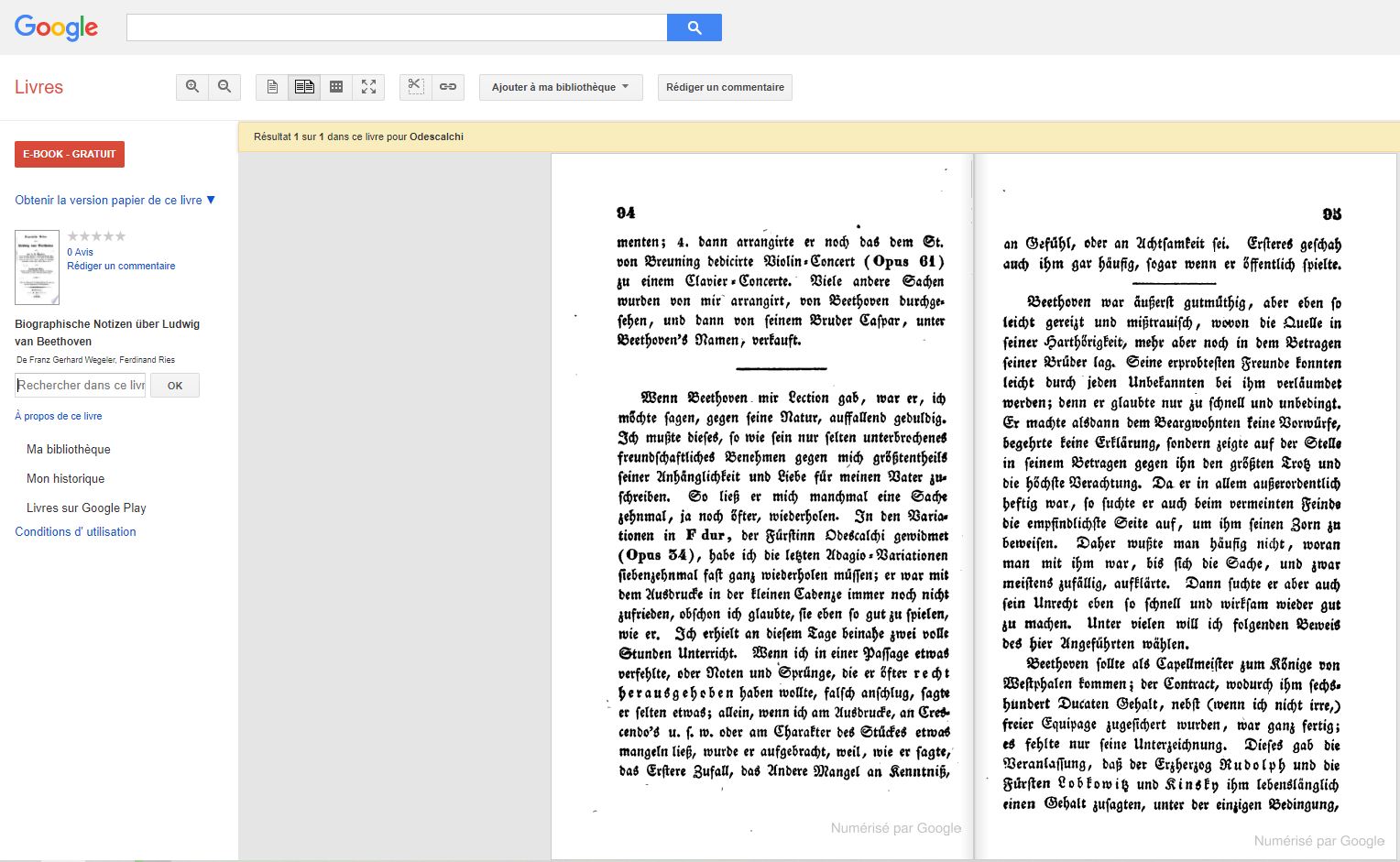I cannot remember how and where I came across this quote, but it seemed like something Beethoven would say, so I took it for granted without further critical thought. Let’s go for a different approach today and try to track down the original source.
"To play a wrong note is insignificant; to play without passion is inexcusable."
Ludwig van Beethoven (allegedly)
Let’s start off easy and head over to Wikiquote. On the Beethoven page we find this exact quote… in the Disputed section.

Screenshot of Disputed section on Wikiquote, Beethoven
It reads: "Not found in Beethoven’s known works. It may be a summary of the following description of Beethoven from his piano pupil Ferdinand Ries: “When I left out something in a passage, a note or a skip, which in many cases he wished to have specially emphasized, or struck a wrong key, he seldom said anything; yet when I was at fault with regard to the expression, the crescendo or matters of that kind, or in the character of the piece, he would grow angry. Mistakes of the other kind, he said were due to chance; but these last resulted from want of knowledge, feeling or attention. He himself often made mistakes of the first kind, even playing in public.”[1]
The [1] link directs to the Google Books preview of Thayer’s Life of Beethoven, Volume 1, edited by Elliot Forbes, specifically the section “When Beethoven gave me a lesson” written by Fredinand Ries.

Screenshot of Google Books preview
It reads:
So it appears that he was Beethoven's pupil only upon the pianoforte. The manner in which he was taught is also described in the Notizen (p. 94): "When Beethoven gave me a lesson I must say that contrary to his nature he was particularly patient. I was compelled to attribute this and his friendly -
As luck would have it, the Google Book preview cuts off right at juicy part - the part we're looking for!
So it seems I’ll have to source this book from elsewhere. Meanwhile, I did some more digging on the Wikiquote Beethoven discussion page, and came across this interesting exchange:

Screenshot of Wikiquote discussion
It reads:
“it goes around online, but i cannot find any source for this. maybe someone who speaks german can find the original?(...)[Falsche Noten zu spielen, ist unbedeutend. Ohne Leidenschaft zu spielen, ist unentschuldbar]
My guess is that it’s made up. The earliest match I can find is from a 1997 magazine for school bands in the US: “Wrong notes are of little consequence, but to play without passion is inexcusable”.(...)
Not a direct quote, but Beethoven did say something along those lines … according to this reddit discussion. Ferdinand Ries wrote about his experiences taking lessons from Beethoven. Look for (ctrl+F) ‘fehlerhaftem Klavierspiel’ (faulty piano performance) on this page and you’ll see the exact excerpt in both English and German.(...)
It was in a piano tutoring scene from the 1994 Movie “Immortal Beloved”.”
So is seems there’s also a German equivalent floating around (Falsche Noten zu spielen, ist unbedeutend. Ohne Leidenschaft zu spielen, ist unentschuldbar), and there’s a similar quote in that American magazine for school bands. Sadly, the magazine link leads to a Google Books copy of The Instrumentalist, Volume 52, Issues 1-6 from 1997, which refuses to display the quote for me. It seems like a copy of a copy of a quote, so I’m discounting it for now.
Thus the main suspect here might be indeed Ferdinand Ries. But just to cover all bases, I decide to look up the 1994 movie Immortal Beloved, which is a dramatisation of Beethoven’s romantic life (though a little ahistorical it seems). As I was looking for the script, I found that the website Drew’s Script-O-Rama had painstakingly transcribed the dialogue from the movie, to my great relief (massive credit to Drew for this!).
As I skimmed through the script nothing seemed to obviously match the alleged quote, except for this small part, one quarter the way in the dialogue:
A mistake is nothing.
But the fact that you
thump out the notes…
…without the least sensitivity
to their meaning is unforgivable.
And your lack of passion
is unforgivable.
It’s cute – melodramatic. I haven’t seen the movie, but I’m sure Gary Oldman makes a fine Beethoven. Anyway, we can rule this out as the source. So let’s go find that book now.
I look up “fehlerhaftem Klavierspiel” in the discussion link and find this German-English excerpt, on the now defunct website Raptus Association, which was a comprehensive Beethoven fan site. Read just the paragraph in English if you don't do German.

Screenshot of Raptus Association
It reads:
Rezeption zu Beethovens Lebzeiten
Ferdinand Ries’ Bericht in den Notizen vermittelt uns nicht nur einen lebendigen Eindruck von Ries’ Spiel dieser Variationen, sondern auch von Beethovens Einstellung zu ‘fehlerhaftem Klavierspiel’:
“In the Variations dedicated to the Princess Odescalchi (Op. 34), I was obliged to repeat the last Adagio variations almost entirely seventeen times; yet he was still dissatisfied with the expression of the little cadenza, although I thought I played it as well as he. On this day I had a lesson which lasted nearly two hours. If I made a mistake in passages or missed notes and leaps which he frequently wanted emphasized he seldom said anything; but if I was faulty in expression, in crescendos, etc., or in the character of the music, he grew angry because, as he said, the former was accidental while the latter disclosed lack of knowledge, feeling, or attentiveness. The former slips very frequently happened to him even when he was playing in public” (TF: 295; —
“Von den Variationen, die der Fürstin Odescalchi (Op. 34) gewidmet waren, musste ich die letzten Adagio-Variationen siebzehn Mal fast ganz wiederholen, und doch war er mit dem Ausdruck der kleinen Kadenz immer noch nicht zufrieden, obwohl ich dachte, dass ich sie so gut gespielt hatte wie er. An diesem Tag hatte ich eine Lektion, die fast zwei Stunden dauerte. Falls ich in einer Passage einen Fehler machte oder Noten und Sprünge ausließ, die er oft betont haben wollte, sagte er selten etwas; wenn ich jedoch im Ausdruck, in den Crescendos, usw., oder im Charakter der Musik Fehler machte, wurde er zornig, da, wie er sagte, das erstere zufällig sei, während das letztere einen Mangel an Wissen, Gefühl oder Aufmerksamkeit zeigt. Die erstern Fehler passierten auch ihm oft, wenn er öffentlich spielte).
So Ferdinand’s recollection of Beethoven correcting his playing does seem to fit the themes of the alleged quotation – Beethoven said nothing of missed notes and leaps, but he grow frustrated with faults in musical expression. It seems like someone just right up reshaped a historical account into a snappy inspirational quote for the ages. But I still want to check an actual book, just to make sure the quote is accurate. See that little “TF: 295” at the end of the English part? It stands for “Thayer-Forbes”, page 295 – the same guy as before. Right, so off to the library we go!
I requested in advance Thayer’s Life Of Beethoven (1967) from the British Library and lo and behold, page 295 does indeed hold the exact English quote, the key to our inspirational mystery.

Photo of Thayer's Life Of Beethoven
Bingo! We found the exact Ferdinand quote. However, since Thayer quotes Ferdinand’s Notizen, I went looking for the original original source, which seems to be Beethoven Remembered: The Biographical Notes of Franz Wegeler and Ferdinand Ries (original German: Biographische Notizen über Ludwig van Beethoven), the English translation published in 1937, the original German published in 1838. The original is available in full on Google Books in a scanned (searchable!) format. I found the German quote referenced above on pages 94-95.

Screenshot of Biographische Notizen über Ludwig van Beethoven
So I guess this is it. Inspirational quote officially debunked, with the help of the Internet and the British Library – as per usual. Now – does this matter, at all? Does knowing the original context change, in any way, the “inspiration” coming from the quote?
I think it does. Too often classical music seems to be reduced to easily-digestible aphorisms that often miss the point (“passion is all that matters! – but makes sure you play all the notes correctly – and remember to give a truly original interpretation! – but only if it’s something I’ve already heard from other famous pianists”).
I guess the word “passion” trivialises the original here. Passion can mean anything – you can have passion for running a marathon or ending child labour – but they’re not equivalent and are not motivated by the same thing. By just labelling it as “passion” it missed on the minutiae of a performance – the knowledge, the feeling, the attentiveness – in a word, the intense care that has to be poured into a performance (that's 11 words - nevermind). Passion? Passion is trivial. And passion alone will not get you to where you want to go. So in conclusion, here are the correct quotes:
"To play a wrong note is insignificant; to play without passion is inexcusable."
Some random person on the Internet
"If I made a mistake in passages or missed notes and leaps which he frequently wanted emphasized he seldom said anything; but if I was faulty in expression, in crescendos, etc., or in the character of the music, he grew angry because, as he said, the former was accidental while the latter disclosed lack of knowledge, feeling, or attentiveness. The former slips very frequently happened to him even when he was playing in public."
As seen in Forbes, Elliot. Thayer's Life Of Beethoven. Princeton University Press, 1967, p. 295. Original: Wegeler, Franz Gerhard, and Ferdinand Ries. Biographische Notizen Über Ludwig Van Beethoven. Bädeker, 1838, pp. 94-95.